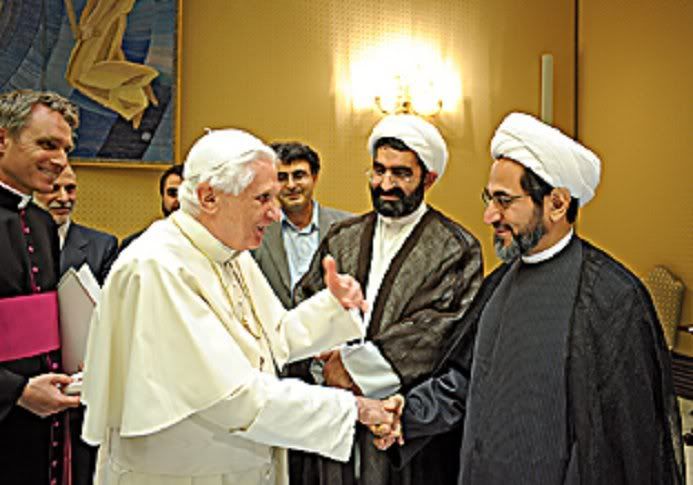There was meeting between Pope Benedict and the some big clerics from Iran that sort of went under the radar here in the USA for some reason.
We see that an agreement was reached that included the following that was issued in a joint statement:
1. Faith and reason are both God's gifts to humanity.
2. Faith and reason do not contradict each other; although faith can in some cases be above reason, it never can be against it.
3. Faith and reason are intrinsically nonviolent. Neither reason nor faith should be used for violence; nonetheless, at times, both have been ill-used to perpetrate violence. In any case, these events cannot place reason or faith in doubt.
4. Both of the parties agree to cooperate in furthering authentic religiosity, and in particular spirituality, to promote respect for sacred symbols and moral values.
5. Christians and Muslims should proceed from tolerance, recognizing differences, remaining aware of things they have in common, and giving thanks for these to God. They are called to reciprocal respect, that is, to condemning derision of religious creeds.
6. Generalizations should be avoided when speaking of religion. The differences between the confessions within Christianity and Islam as well as the differences in historical context are both important factors to be taken into consideration.
7. Religious traditions cannot be judged on the basis of a single verse or passage in their respective sacred texts. A holistic vision and an adequate hermeneutic method are necessary for their correct comprehension.
Are the Iranians serious or is this just a game? A must read article on this is found in the Asia Times by a very respected journalist called The heart has its own unreason It shows that the Iranians might have very much other political goals here.
Spengler writes:
Tactical aims condition some part of Tehran's sudden regard for the sanctity of reason. As the Catholic News Service reported on April 29, Iran's government is searching for allies against American-led efforts to isolate it:
L'Osservatore Romano has cited the words of Iran's President Mahmud Ahmadinejad, praising the Holy See for its diplomatic efforts. During an April 6 meeting with the new papal nuncio in Iran, Archbishop Jean-Paul Gobel, Ahmadinejad said that the Vatican has been a positive force for justice, peace, and the protection of human rights around the world, L'Osservatore reported. Iran has been maneuvering to secure the support of the Holy See to counteract hostile pressure from the US and European nations.
Needless to say if this is part of a new Isamic "reformation" that would be great. However I suspect the Vatican and Pope Benedict are realistic about what will happen. As Spengler states to point 7 of the joint statement cited above:
The final point contains a submerged mine on which the Muslim side well might founder, for the application of reason to sacred texts presents an existential threat to Islam.
As Pope Benedict has observed on many occasions, no Catholic scholar of note doubts that the Bible contains multiple authorship of key texts as well as later redaction. In the Christian view, the Hebrew and Greek writings that comprise the Bible are the word of God, but through human witness, such that the occasional error or contradiction poses no threat to faith.
Not so the Koran, which purportedly was dictated word by word by the Archangel Gabriel to Mohammed. Western scholars who have discovered minor variants in ancient copies of the Koran take their lives in their hands when they publish such results (see Indiana Jones meets the Da Vinci code Asia Times Online, January 15, 2008). To include under the rubric of reason freedom for textual criticism threatens the existence of Islam. With all due respect for sacred texts, and without derision, scholars well might seek to demonstrate that the Koran was written in the 9th rather than the 7th century, and not at all by Mohammed, who might or might not have existed to begin with. My September 2006 critique of Benedict's Regensburg address did not consider this dimension.
The Holy Father's engagement of Isalm and the way he his doing it will perhaps be one of the big stories of his Papacy when history is written.
















No comments:
Post a Comment